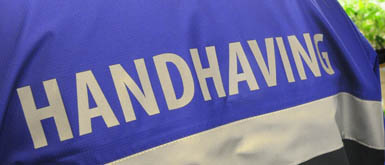
My husband and I, along with our daughter, began to visit The Netherlands about four years ago after our younger son married a Dutch woman and subsequently moved there. He now lives in a small town outside of Utrecht, and my daughter-in-law’s parents live quite near Utrecht, so we make the city our base of operations. Lucky us—it is a beautiful, charming, vibrant place. Maybe our favorite city in Holland. And because we’ve been there a few times, we can enjoy just strolling along the Oudegracht or relaxing at a café people watching (yes, and drinking beer—this is Holland) without feeling the need to schlep to the important “sites.”
One afternoon as we sat on a bench a block from the Dom Tower—the symbol of Utrecht—we noticed a police car pull up in front of a van that was parked partially on the sidewalk. Clearly, the van was not supposed to be there. Two officers got out of the car and went to look at and into the van. Then they walked over to the smoothie truck doing a brisk business across the street and asked the proprietor if she knew anything about the van. No luck. Then they stopped into a store nearby and made further inquires. Bingo. A woman came out of the shop carrying a carton and loaded it into the van as she chatted amicably with the officers, who then got into their car and left. The woman finished whatever it was she needed to do and, eventually, she, too, drove off.
We were amazed. That ain’t how it goes down back home. If a traffic cop in New York City had spotted a vehicle illegally parked by even an inch, he or she would have started writing the ticket instantaneously, and, if the poor schmuck who owned the car tried to talk to them, plead with them, well, you know how well that would go. I don’t think anyone’s ever had a pleasant exchange, to say the least, with a NYC traffic cop.
When I mentioned what I’d seen in Utrecht to my daughter-in-law, she explained that the Dutch officers were not police, but part of the Handhaving unit (translated as maintenance, upkeep; assertion, enforcement). In addition to parking issues (including bikes and scooters—again, this is Holland), they monitor illegal waste dumping, and “nuisance behavior.” They also can request identification or issue fines or warnings for petty offences, and, if they consider it necessary, they notify the correct authorities or the police. They are authorized to use force with or without the use of weapons (meaning batons, not guns). Most officers are equipped with handcuffs, and in Utrecht and Amsterdam they also carry pepper spray.
Handhavers are there to make sure civic life goes along smoothly. (Our daughter-in-law, a teacher, also told us that one of her students, a 14-year-old boy, wrote his English essay on wanting to be a Handhaver when he grew up so that he could help people.)
What a great idea—an official organization that supports the police and serves as eyes on the street—and is not antagonistic to the public it serves. Car parked illegally? There must be a reason. Oh, you’re running a business and need to load things into the van. You’re leaving in ten minutes? Okay. Alstublieft. Have a good day.
I recognize that the Netherlands is a much smaller country than the United States and more homogenous (although this is changing). But imagine employing people as Handhavers in our cities. In view of the horror of the recent shootings of both police and civilians in the U.S., wouldn’t it be wonderful if a little Handhaving could give us a hand in reducing the tension between the police and the public? Things are not ideal in Holland, but the Dutch seem to have a better idea of how to treat each other and how, in a sensible, humane way, to keep the peace.

